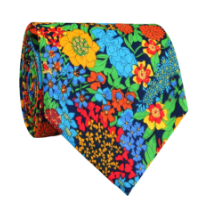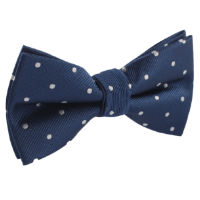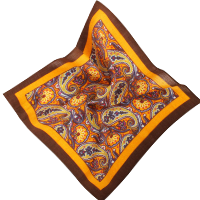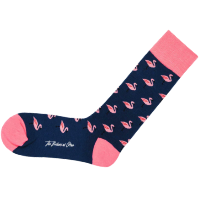Best Materials For Dress Shirts
A well-crafted dress shirt is an essential piece in any gentleman's wardrobe. Whether you're dressing for a business meeting or a special event, the fabric you choose makes all the difference in comfort, style, and durability. Knowing the best materials for dress shirts, especially no-iron dress shirts, will help you end up with a shirt you're always happy to put on rather than dread because you don't love the fit.
We'll explore the top fabrics for dress shirts, their unique characteristics, and how to choose the perfect material based on your needs and preferences. From cotton to silk, we've got you covered.
Why the Type of Fabric Matters for Dress Shirts
The fabric of your dress shirt isn't just about how it looks; it's about how it feels, breathes, and, most importantly, maintains its shape. Choosing the right material ensures your dress shirt stays wrinkle-free and retains its form, making it a long-lasting investment in your wardrobe.
- Comfort is key. The fabric for your dress shirt should feel like a second skin, keeping you at ease throughout the day and adapting to different temperatures. Your comfort is our priority.
- Durability: High-quality materials withstand wear and tear, washing, and ironing, ensuring your shirt looks great for longer.
- Style: The fabric's texture and sheen can enhance the overall look, whether you're aiming for a formal or casual appearance.
Different dress codes require different shirt types, including the fabric itself. For example, the kind of shirt you'd wear to a black-tie event drastically differs from one you'd wear on a first date unless you're trying to impress her.
Best Fabrics for Dress Shirts: Side-by-Side Comparison
|
Fabric Type |
Benefits |
Disadvantages |
|
Cotton |
Breathable, durable, hypoallergenic, easy to maintain |
Absorbs moisture, lacks elasticity, prone to shrinking |
|
Oxford Cloth |
Sturdy, resistant to wrinkles |
Limited colour options |
|
Poplin |
Lightweight, smooth, and crisp with a silky finish |
Limited colour choices |
|
Pinpoint |
Elegant, unique texture, comfortable to wear |
Requires more maintenance |
|
Herringbone |
Attractive pattern, durable |
Tends to wrinkle and needs frequent ironing |
|
Linen |
Highly absorbent, easy to maintain, naturally repels insects |
Easily wrinkles, challenging to iron |
|
Polyester |
Long-lasting, low maintenance, wicks moisture |
Not very breathable, poor at absorbing moisture, retains odours |
|
Flannel |
Warm, soft, and durable |
Prone to shrinkage and wrinkles, it needs careful care |
|
Seersucker |
Breathable, versatile, maintains a wrinkle-free look |
Requires delicate washing, less suitable for formal wear |
Let's go into some further detail.
Cotton: The Go-To Fabric for Dress Shirts
Cotton is the classic choice for dress shirts. It offers the ideal blend of comfort, breathability, and durability. It's also great for the Australian climate, keeping you cool in summer and warm in winter.
Benefits of Cotton Dress Shirts
- Breathability: Cotton allows air to circulate, making it ideal for warm climates and reducing sweat buildup.
- Comfort: Its soft texture feels gentle against the skin, ensuring all-day comfort.
- Versatility: Cotton can be woven into various textures and weights, making it suitable for casual and formal shirts.
- Durability: High-quality cotton shirts can withstand frequent washing and ironing, maintaining their shape and appearance.
Cotton is a trusted dress shirt fabric, but there are multiple types of cotton. Let's take a look:
Types of Cotton Weaves
- Poplin: A lightweight and smooth weave, perfect for a sleek, polished look.
- Oxford: A thicker, textured weave for casual and smart-casual occasions.
- Twill: Known for its diagonal weave, it's well-resistant to wrinkles and drapes.
- Broadcloth: A tightly woven fabric that offers a crisp, formal appearance, ideal for business settings.
Linen: Light and Breathable for Warm Weather
Linen is a solid choice for dress shirts, especially during the warmer months. Made from the flax plant, it offers a relaxed, breezy feel perfect for the Australian summer.
Advantages of Linen Shirts
- Highly Breathable: Linen's open weave allows maximum airflow, keeping you cool.
- Moisture-Wicking: It absorbs moisture without feeling damp, ideal for humid climates.
- Natural Texture: Linen's characteristic wrinkles add to its casual charm, making it perfect for less formal settings.
Ideal Occasions for Linen Shirts
- Outdoor events like beach weddings or garden parties.
- Casual office settings or casual Fridays.
- Weekend gatherings or relaxed social events.
Silk: The Luxurious Choice for Special Occasions
Silk dress shirts are a cut above the rest when aiming for high fashion. They require more care than other fabrics but are worth the extra hassle. Pairing a silk shirt with a bowtie or pocket square is the only way to wear it, and you best make sure you're the best dressed at whichever formal event you're headed to.
Benefits of Silk Dress Shirts
- Luxurious Feel: Silk is incredibly soft and smooth, providing unmatched comfort.
- Natural Shine: The subtle sheen of silk adds a refined touch to any outfit.
- Thermoregulating: Silk keeps you cool in summer and warm in winter, making it suitable for various climates.
When to Wear Silk Shirts
- Black-tie events or formal dinners.
- Weddings and special celebrations.
- High-profile business meetings or upscale gatherings.
Blended Fabrics: Combining the Best of Both Worlds
Blended fabrics combine the strengths of multiple materials, such as cotton, polyester, and elastane, to enhance performance and comfort. This makes them suitable for formal settings and more relaxed styles, so if you want to swap out your standard tie for a slim men's tie, this would be the time to do it!
Popular Blends for Dress Shirts
- Cotton-Polyester: Combines the softness of cotton with the durability and wrinkle resistance of polyester.
- Cotton-Lycra: Adds stretch to cotton for improved comfort and flexibility.
- Linen-Cotton: Balances the breathability of linen with the softness and structure of cotton, reducing wrinkling.
Why Choose Blended Fabrics?
- Wrinkle Resistance: Blends often require less ironing and maintain a crisp look throughout the day.
- Improved Fit: Stretch blends like cotton-Lycra offer a tailored fit that moves with you, providing comfort without compromising style.
- Versatility: Depending on the composition, blends can be suitable for formal and casual occasions.
How to Choose the Best Dress Shirt Fabric
Fabrics like broadcloth or silk are ideal for formal events, while linen or cotton blends are better for casual settings. Accessorising with items like swank cufflinks or pocket squares can further elevate your outfit, adding a personal touch that reflects your style.
- Consider the Climate—For hot climates, Choose breathable fabrics like cotton, linen, or lightweight blends. In cooler weather, opt for thicker weaves like Oxford or twill cotton.
- Match the fabric to the Occasion – Formal events call for fabrics like broadcloth or silk. At the same time, casual settings are better suited to linen or Oxford cloth. Choose based on the event's dress code and your personal style.
- Prioritise Comfort—Cotton and cotton blends are the best fabrics for combining style and comfort and can be worn in a variety of settings.
- Factor in Care Requirements – Some fabrics, like silk, require special care. In contrast, others, like cotton-polyester blends, are easy to maintain. Consider how much time you'll spend caring for your shirts – cotton is the easiest to maintain.
Caring for Different Dress Shirt Fabrics
- Cotton – Wash in cold water with a mild detergent to prevent shrinkage and iron while slightly damp for best results.
- Linen: Hand wash or use a gentle cycle with cool water, then air dry. For a relaxed look, embrace the natural wrinkles.
- Silk – Dry clean or hand wash with a silk-specific detergent, avoid direct sunlight, and store on padded hangers.
- Blended Fabrics – Follow care instructions based on the dominant fabric in the blend and use low heat for washing and drying to maintain fabric integrity.
Frequently Asked Questions
What material should dress shirts be?
For comfort and versatility, dress shirts should be made from breathable and durable fabrics like cotton, linen, or cotton blends.
What is the highest quality shirt material?
Long-staple cotton, such as Egyptian or Pima cotton, is often considered the highest-quality shirt material due to its softness, strength, and durability.
What is the best material for a work shirt?
The best material for a work shirt is a cotton-polyester blend, offering comfort, durability, and wrinkle resistance for a polished look throughout the day.
What is the best material for dress shirts in hot weather?
Linen is the best material for dress shirts in hot weather. It is lightweight, breathable, and effectively wicks moisture.





